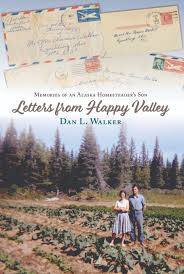A stroke of fate entered Dan Walker’s life five years ago and now, he wishes to share it with the world.
Walker will be entertaining interested guests Thursday at 6:30 p.m. at Kenai Peninsula College as part of the KPC Showcase events schedule. He will share memories and take audience questions as he discusses his recently released book, “Letters from Happy Valley: Memories of an Alaska Homesteader’s Son”, published last November by Ember Press.
“It’s a rather unique project,” Walker explained. “What really makes the book is about five or six years ago, my (family) found a cache of letters my parents had written.”
Walker, a longtime teacher and writer from Seward who has authored two books — with a third on the way — received a shoebox full of old letters in the mail that his parents saved over a six-month period spanning June 1958 to January 1959, when the Walker family moved north from Ohio to settle on homesteaded property on the southern Kenai Peninsula.
Walker has lived in Seward since 1978, where he taught middle school language arts and social studies for 22 years. One of his lifetime honors was receiving the Alaska Teacher of the Year award in 1999, which gave him the opportunity to meet then President Bill Clinton.
Walker also spent 10 years working with rural schools in a teacher-mentor program, but now predominantly spends his time writing. Walker’s first book, “Secondhand Summer,” was published in 2016 and details his family’s move from the peninsula to Anchorage in the mid-1960’s.
“When ‘Secondhand Summer’ was published, I finally made the commitment to being a writer,” Walker said. “It’s like being an alcoholic, you have to stand up and admit it.”
The Walker family left Sugar Tree Ridge, Ohio in 1958 with their eye on Alaska, eventually settling in the Happy Valley area just north of Homer. During that time of great change, Walker said his parents preserved their experiences of daily life in the rugged wilderness, from building a home for the family to hunting and harvesting moose for the winter.
Walker was 11 when his father died of a heart attack and the loss of the family patriarch necessitated a move to Anchorage.
Walker said his grandmother in Ohio had kept meticulous care in keeping the letters safe on a closet shelf for years. When his grandmother passed away, the letters were passed on to Walker’s aunt, who kept them herself until her passing.
Eventually, the letters landed in the possession of Walker’s cousins, who sent them off in the mail to Alaska.
When Walker opened up the package to sort through the treasured items, he said it reignited an interest in those early years.
“It was just a curiosity at first, and when we finally opened them, it was like, wow,” he said. “We didn’t know they existed. We didn’t think they still existed on the other end.”
Walker said the letters came tethered in a three-ring binder that measured four inches thick, giving him a lot of time to peruse through his parents’ thoughts and help fill in gaps in his own memory.
“It was basically telling the story of what we were doing,” he said. “They kept journals of what we were doing, like dad building the house, and he wrote it down like he was talking to his father.”
At age 5, Walker only held vague memories of that formative period in his life, but his parent’s letters cast new perspective on what his family experienced in the early days of peninsula life, just before Alaska officially entered statehood.
“The letters came through their perspective of how things were,” he said. “I think it’ll give people a sense of what it was like, and also to help some people understand what the homestead experience was like and why did some people stay and why did some leave.”
Walker said the homesteaded land still rests in his possession, although the original cabin burned down 20 years ago, but the lasting memory of the fortitude and gumption required of his parents to forge a lifestyle in the Last Frontier will remain with him forever.
“I think my parents projected a real optimism,” he said. “They enjoyed what they were doing. That becomes very clear.”

